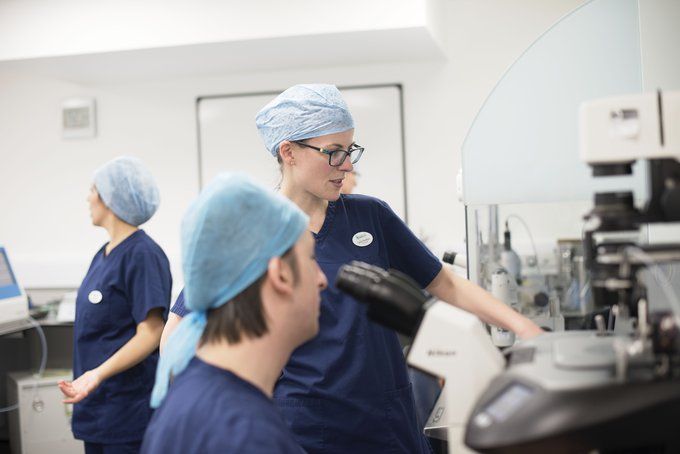
Did we answer all your fertility questions today?
If you still feel you need more guidance and support, you can book a FREE 1-2-1 discovery meeting to talk through the options available to you.
Preimplantation Genetic Testing for Aneuploidies (PGT-A) is a form of IVF genetic testing that checks if your embryos have the right numbers of chromosomes for a successful ongoing pregnancy, at an early stage prior to embryo transfer.
Some embryos which may appear normal under the microscope may in fact be chromosomally abnormal – known as aneuploidy - and don’t have the required 46 chromosomes in each cell.
As the embryo’s genetic ‘instructions’ are incorrect, it can’t form a healthy baby, and in many cases affected embryos either do not implant or miscarry.
PGT-A may be discussed with you as part of your IVF cycle if you have:
Preimplantation Genetic Testing for Aneuploidies may:
Joanne and Andrew had their baby, Ernest Thomas, with the help of PGT-A.
Baby Ernest was born in April 2018, after our fertility doctors identified that genetically-abnormal embryos together with a misplaced window of implantation were the cause of the couple’s fertility struggles.
You will undergo ovarian stimulation to produce mature eggs, which are then fertilised in our laboratory. We will monitor embryo development.
We will advise if any of your embryos reach the required Day 5 Blastocyst stage for PGT-A testing. We will check your embryos have high-quality cells and are suitable for biopsy.
Several cells will be carefully taken from each embryo by our embryo biopsy practitioners and transferred to a special genetics laboratory for testing.
Whilst we await your PGT-A results, your embryos are cryopreserved. Results take around two weeks.
Our embryologists will use the results to determine which of your embryos are suitable for transfer. By using PGT-A, it is very likely that you will have fewer embryos available for transfer than you would have had if you did not do PGT-A. This is because embryos that test grossly abnormal are not transferred.
You will undergo a Frozen Embryo Transfer, which involves optimising and preparing your uterus for pregnancy and precisely timing your embryo transfer. Only one embryo will be thawed and transferred in each cycle to reduce your risk of multiple pregnancy.
Deciding to proceed with PGT-A is a very sensitive and individual decision.
Your Manchester Fertility consultant will discuss the benefits and risks with you in your particular case, so you can make an informed choice about whether to have PGT-A in your IVF treatment.
PGT-A identifies if an embryo has more or less whole chromosomes than the required number to develop into a healthy baby – so it may not detect abnormalities involving smaller pieces of chromosomes and other types of chromosome anomalies.
PGT-A does not detect genetic disease mutations or test for specific genetic conditions. We cannot tell you the gender of an embryo.
PGT-A can only be performed on embryos that have reached Day 5 Blastocyst stage. This is because PGT-A tests the cells from the embryo that form the placenta. Only embryos that have reached Blastocyst stage will have these cells.
PGT-A is a very delicate and intricate procedure using state of the art technology, and Manchester Fertility embryologists have had intensive embryo biopsy training to perform PGT-A, with less than 1% risk of damage to an embryo during cell extraction.
PGT-A can be performed on embryos already frozen in storage with us. We can thaw these to perform testing if advised. Your embryos will need to be re-frozen afterwards, which we can do successfully and at minimal risk to your embryos.
PGT-A may show you have no normal embryos which are suitable for transfer. And although PGT-A is highly accurate, the risk of a pregnancy affected by a chromosome abnormality is not removed entirely.
Add-ons are optional extras that you may be offered on top of your normal fertility treatment, often at an additional cost.
Some clinics may include certain add-ons with their treatment packages as standard whilst others charge separately, this add-on is in an option extra not included as part of your treatment and can be paid for as an extra part of your treatment, at Manchester Fertility we do charge for this add-on.
Your doctor will be able to provide you the complete information and risk associated with any of these add-ons, we offer these add-ons after a full discussion with our experts and after your specific individual circumstances have been considered.
If you require more information on add-ons you can visit the HFEA website here.

If you still feel you need more guidance and support, you can book a FREE 1-2-1 discovery meeting to talk through the options available to you.



